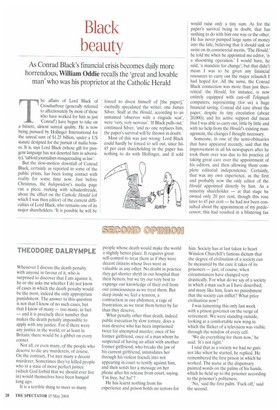THEODORE DALRYMPLE
Whenever I discuss the death penalty with anyone in favour of it, who is surprised to discover that I am against it, he or she asks me whether I do not know of cases in which the death penalty would be the most, indeed the only appropriate punishment. The answer to this question is not that I know of no such cases, but that I know of many — too many, in fact — and it is precisely their number that makes the death penalty impossible to apply with any justice. For if there were any justice in the world, or at least in Britain, there would be a gibbet on every corner.
Not all, or even many, of the people who deserve to die are murderers, of course. On the contrary, I've met many a decent murderer. Sometimes they've killed people who in a state of more perfect justice (which God forbid that we should ever live in) would themselves have been hanged long ago.
It is a terrible thing to meet so many people whose death would make the world a slightly better place. It requires great self-control to treat them as if they were decent citizens whose lives were as valuable as any other. No doubt in practice they get shorter shrift in our hospital than their betters, but we try our very best to expunge our knowledge of their evil from our consciousness as we treat them. But deep inside we feel a tension, a contraction in our abdomen, a rage of frustration, as we treat them better by far than they deserve.
What penalty other than death, indeed public execution by slow torture, does a man deserve who has been imprisoned twice for attempted murder, once of his former girlfriend, once of a man whom he suspected of having an affair with another former girlfriend, who breaks the jaw of his current girlfriend, intimidates her through his violent friends into not appearing in court to testify against him, and then sends her a message on her phone after his release from court, saying, 'I'm free, ha! ha!'?
He has learnt nothing from his experience and prison holds no terrors for
him. Society has at last taken to heart Winston Churchill's famous dictum that the degree of civilisation of a society can be measured by the care it takes of its prisoners —just, of course, when circumstances have changed very drastically. For what do we say of a society in which a man such as I have described, and many like him, fears no punishment that the society can inflict? What price civilisation now?
I was lamenting this only last week with a prison governor on the verge of retirement. We were standing outside, looking at a comfortable new wing in which the flicker of a television was visible through the window of every cell.
'We do everything for them now,' he said. 'It's not right.'
I said that as a society we had no guts: not like when he started, he replied. He remembered the first prison in which he worked. The nurse at the dispensary painted words on the palms of his hands, which he held up to the prisoner according to the prisoner's politeness.
'No,' said the first palm. 'Fuck off,' said the second.


































































































 Previous page
Previous page